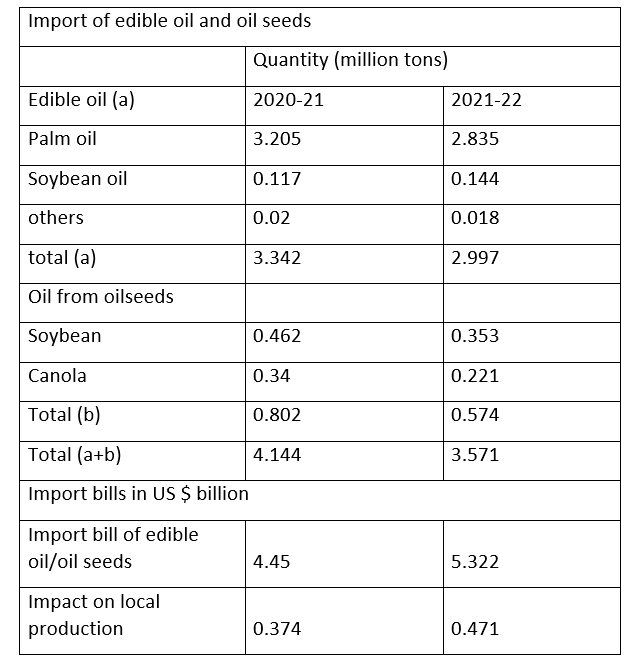INP-WealthPk
M Arsalan Ali
Regulatory duty on imported edible oil will reduce imports, and minimum intervention prices (MIP) will encourage farmers to increase production locally, allowing the country to become self-sufficient in the production of edible oil, and reduce the hefty imported oil bill, said Dr Syed Waseemul Hasan, Food Security Commissioner at the Ministry of National Food Security and Research.
He said setting an MIP for edible oil at Rs7,000 per 40kg will give farmers confidence that the government will protect them if edible oil prices fall due to fluctuations in the international market. The official said that if the prices of edible oil/oil seed come down from the MIP then the government will intervene and procure it from farmers. The cost of producing 40kg edible oil in Pakistan is less than Rs7,000, while the import price from other countries costs more than the MIP.
He said the local industries will make purchases from farmers at the MIP because that will give benefit both to farmers and industries, as imports will cost them more. By doing so, local production would increase and import would decrease. The revenue that will generate from RD will help to support the MIP, and no separate budgetary allocation will be needed for that. Dr Waseem said this plan will provide $1.192 billion import substitution in short term (one year), and medium-term (five years) and long-term (10 years) to the tune of $2.064 billion, and $7.668 billion, respectively.
Data from Pakistan Bureau of Statistics (PBS) shows that the import of soybean oil and palm oil during the July-November (FY23) period of the current fiscal year was recorded at $144.094 million and $1.724 billion compared to $43.095 million and $1.527 billion during the same period of last fiscal year, up 234% and 13%, respectively. He added that the total edible oil requirement in 2020-21 was 4.517 million tonnes, of which 4.143 million tonnes was imported, accounting for 92%. The import bill in 2021 was $4.45 billion.

Ministry of National Food Security/WealthPK research
Dr Waseem said palm oil and soybean have a significant import share in edible oils and that imports of palm oil decreased by 12% to 2.835 million tonnes in 2021-22, compared to 3.205 million tonnes in 2020-21. He said the import of soybean oil surged by 23% and reached 0.144 million tons in 2021-22 compared to the same period of last year when import was recorded at 0.117 million tons.
Imports of edible oil and oilseeds fell by 14% to 3.571 million tonnes in 2021-22 from 4.144 million tonnes in 2020-21. He added that in monetary terms, the import bill of edible oil/oil seed increased by 15% and remained at $5.322 billion in 2021-22 compared to the previous year when the import bill was recorded at $4.450 billion.
Pakistan imports a large portion of its palm oil from Indonesia. Because of export restrictions, the palm oil prices have risen, resulting in a hefty import oil bill. Dr Waseem said that due to rising prices, local production increased by 26% to 0.471 million tonnes in 2021-22, up from 0.371 million tonnes the previous year.
“In comparison to India and Bangladesh, Pakistan has the highest per capita/per annum consumption of edible oil in the region,” he said. Per capita/per annum consumption of edible oil in Pakistan is 21.87kg, while the consumption of edible oil in India is 16.06kg, and Bangladesh 17.91kg.
Credit : Independent News Pakistan-WealthPk




